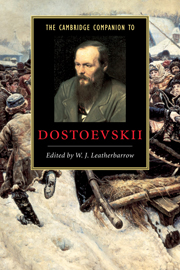Book contents
- Frontmatter
- 1 Introduction
- 2 Dostoevskii and the Russian folk heritage
- 3 Dostoevskii and literature
- 4 Dostoevskii as a professional writer
- 5 Dostoevskii and money
- 6 Dostoevskii and the intelligentsia
- 7 Dostoevskii and psychology
- 8 Dostoevskii and religion
- 9 Dostoevskii and the family
- 10 Dostoevskii and science
- 11 Conclusion
- Further reading
- Index
1 - Introduction
Published online by Cambridge University Press: 28 May 2006
- Frontmatter
- 1 Introduction
- 2 Dostoevskii and the Russian folk heritage
- 3 Dostoevskii and literature
- 4 Dostoevskii as a professional writer
- 5 Dostoevskii and money
- 6 Dostoevskii and the intelligentsia
- 7 Dostoevskii and psychology
- 8 Dostoevskii and religion
- 9 Dostoevskii and the family
- 10 Dostoevskii and science
- 11 Conclusion
- Further reading
- Index
Summary
When the idea for a Cambridge Companion to Dostoevskii was first mooted it was recognised, first, that Dostoevskii had been extremely well served over many years by his critical commentators, in the West as well as in Russia, and, secondly, that the need for a further volume designed to introduce this author to yet another generation of students and more general readers was not self-evident and perhaps required some justification. To acknowledge this latter point is not at all the same as to imply that Dostoevskii's star is somehow on the wane or that the immense popularity his work has enjoyed is in decline. At the start of the twenty-first century his work is as widely admired as it has ever been, and its impact continues to resonate in cultural activity throughout the world more than a century after his death. Moreover, this resonance has been felt not just in the 'higher' or 'élite' manifestations of literary activity, but is also discernible in more popular forms of fiction such as the detective novel. Put simply, Dostoevskii seems unwilling to settle into the role of venerable classic, that of an author admired for the way his work once spoke loudly to his contemporaries, but whose impact in the present is more akin to that of a whisper. To employ an over-used term, Dostoevskii's novels still seem pressingly 'relevant' to the most immediate concerns of the present age in a way that those of his contemporaries perhaps do not. The world depicted in, say, Crime and Punishment or The Devils, despite its chronological and social remoteness, looks so much more like the world we live in than any described by Tolstoi or Turgenev. George Steiner's challenging assertion that 'Dostoevsky has penetrated more deeply than Tolstoy into the fabric of contemporary thought', having done more than any other writer of the nineteenth century to set the agenda and determine the 'shape and psychology' of modern fiction, does not seem over-extravagant. Nor does Alex de Jonge's claim that, along with Proust, Dostoevskii was the artist 'supremely representative' not only of his own age, but also of ours, a nineteenth-century novelist who has continued to provoke strong reactions in his subsequent readership.
- Type
- Chapter
- Information
- The Cambridge Companion to Dostoevskii , pp. 1 - 20Publisher: Cambridge University PressPrint publication year: 2002

